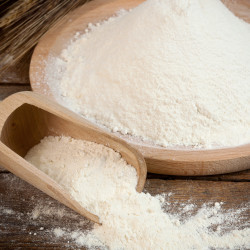China's corn starch
industry has developed rapidly in recent years, a trend that is likely to go on
in 2018. However, importers of Chinese corn starch have to expect lesser volume
and higher prices in the next months, due to the high domestic demand for starch
sugar.

In
the middle of December 2017, China’s corn starch prices ended the surge of
previous months and stabilised on a high level. Market intelligence firm CCM
predicts that the price will continue to rise in the near future due to the
increasing demand, both domestically and overseas.
At
present, China’s corn starch production capacity witnesses a significant
growth, and more enterprises have announced to continue. According to CCM’s
research, the country's corn starch capacity was as big as 40 million t/a in
2017. Following the current trend, the production capacity is very likely to
continue the growing trend in 2018. China implemented the subsidy policy for
corn in previous years to make use of the large corn reserves the country has
gathered in the last decades. Higher profits from corn starch have motivated
enterprises to build and expand corn starch production lines.
China’s
demand for cornstarch is also growing at a double-digit value. After all, a
significant rise comes from the domestic starch sugar sector. Other important
downstream sectors for cornstarch are pharmaceuticals and modified starch.
Especially
the surge in demand for starch sugar is driving the cornstarch market up.
Official numbers are showing, that the demand for starch sugar in China is
growing by more than one-fifth. China’s boost in sugar prices is the main
driver for booming starch sugar demand as a cheaper replacement for the
sweetening effect.
China’s export of
cornstarch
According
to official Customs data, China’s exports of cornstarch in surged by about 150%
YoY in the first three quarters of 2017, compared to the same period in the
previous year.
However,
in the next few months, importers of Chinese corn starch can expect lesser
volume, as the material will be used mainly in the domestic market as raw
material for starch sugar to prepare for the surging demand for food and
beverages around the Chinese New Year festival. Hence, less cornstarch will be
exported to overseas markets. In the meanwhile, it is expected that the corn
price in China will remain high because of government subsidies to corn
purchase as well as increasing demand for corn nationwide. As a result of the
higher ex-works price together with a stable demand, the export price of
cornstarch will continue to rise further in the near future.
The
overall increase in China's export price of corn starch from July to October
mainly resulted from its basically rising ex-works price during this period.
This
is because China's 4th round of rigorous environmental inspections kicked
off at the beginning of Aug. Altogether 8 environmental inspection teams were
sent by the central government to important corn planting areas for
environmental inspections. As the domestic industry of corn deep processing is
subject to the inspections, the supply of cornstarch has declined since then.
Consequently, the domestic ex-works price of cornstarch has been in an uptrend.
China’s corn starch
industry
As
one of the most important sectors of the corn deep processing industry in
China, corn starch industry saw a healthy development in recent years, shown by
the significant increase in output and export volume.
According
to CCM’s research, there have been four main factors that benefitted the
development of the industry in China.
First
of all, the cornstarch cost decreased along with falling corn prices. It is a
fact, that the highest cost factor of corn deep processing is the raw material
cost for corn. When the corn price drops in the market, the cost of sales for
corn deep-processing enterprises falls alongside.
The
second decisive factor can be seen in governmental subsidies. In November 2016,
the Chinese Government announced that the qualified corn deep processing
enterprises in some selected provinces would receive subsidies from the
government for the corn purchased. Those beneficial subsidies are encouraging
many manufacturers to use the full potential of their corn starch production
lines.
Furthermore,
due to dropping prices of corn in previous years, the raw material, domestic
corn starch enterprises, witnessed a continued increase in profits.
Finally,
many market players experienced a much better export performance for their
products in 2016. China's export volume of cornstarch increased to a high
degree, mainly owing to the further drop and better advantage in corn price.
The prices of domestic corn and cornstarch shared almost the same changing trend.
Most
of the corn starch in China is consumed by the domestic market,
despite its larger export volume, with the biggest share taken up by
starch sugar processing. According to official statistics, 60.71% and 6.19% of
the domestic corn starch were used to produce starch sugar and modified starch
respectively in 2016.
About the article
The
information for this article comes from CCM, China’s leading market
intelligence provider for the fields of agriculture, chemicals, food and feed.
Get
monthly premium insights in China’s corn and corn products market by
subscribing CCM’s Newsletter, including information on market trends, company
dynamics, policy changes, import and export analysis, and any other newsworthy
story about China’s corn market.
Join
the discussion about China’s food and feed market and find people from the same
industry in our LinkedIn Group or Facebook group.
Also,
don’t forget to follow us on Twitter:@CCM_Kcomber